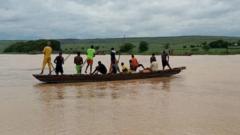In an era of evolving educational landscapes, British boarding schools are making strategic advances into Nigeria, offering local families the prestige of a UK education without the costly commute. Traditionally, affluent Nigerians have prioritized sending their children to esteemed British institutions overseas. However, the recent establishment of campuses by schools such as Charterhouse and Rugby School in Nigeria points to a significant shift in this paradigm.
Charterhouse has already opened a primary school in Lagos and is set to welcome secondary students in this upcoming September. Similarly, Rugby School is introducing secondary education around the same time, while other reputable schools like Millfield, Wellington School, and Harrow are exploring potential expansions in Nigeria. This trend caters to the aspirations of many Nigerian parents who, due to rising costs associated with UK education, prefer a more accessible option closer to home.
Karima Oyede, a British-Nigerian consultant, expresses optimism at having her son transition from Rugby UK's campus to its Lagos counterpart, seeing it as a harmonious blend of quality education and cultural roots. "Having the opportunity to experience the British system in his country of origin is the best of both worlds," she remarks.
This movement signifies not just a financial consideration but also an attempt at preserving cultural identity amidst globalization. Educational consultant Ijay Uwakwe-Okoronkwo emphasizes that while parents seek international recognition for their children, they also wish to retain their African heritage. "Parents are concerned about the loss of 'African-ness' following time spent studying abroad," she remarks, highlighting how new schools are adjusting to local sensitivities, especially with regards to LGBTQ issues.
In light of a saturated Middle Eastern and Chinese market for international schools, Africa remains largely uncharted territory. Nigeria is poised as an entry point to the continent, as Mark Brooks of the UK's Department for Business and Trade points out, "Nigeria is the gateway to Africa, and Africa is kind of the last continent for British schools to establish in." The country is renowned for producing high-achieving students, further enticing these British institutions to expand their reach.
Contributing to this trend is the soaring cost of education in the UK, with exchange rates and a newly imposed 20% VAT on private school fees compounding the burden on families. Charterhouse’s annual fees in the UK reach approximately £60,000, whereas its Nigerian branch’s fees stand at a more manageable £15,000. This affordability, combined with the ability to retain local staff while employing British expats for primary teaching roles, enables these institutions to maintain high-quality education at a fraction of the cost.
While the influx of British boarding schools aims to provide a solution for many Nigerian families seeking quality education, it doesn’t necessarily spell an overhaul of the existing system. As elite local schools face potential competition, the introduction of British institutions may catalyze improvements across the educational sector. Brooks sees collaboration, including partnerships for teacher training, as a means to enhance existing educational practices.
Many parents, aware of their children’s needs and the struggles faced by Nigeria's tertiary education system, express interest in keeping their children close to home while offering them broadly respected educational opportunities. Oyede, whose daughter will also be starting at Rugby School Nigeria, sees these offerings as a chance for families to return and reconnect with their roots.
As the prospective operations of these British institutions unfold, it becomes clear that they offer Nigerian families not only an alternative to international schooling but also a unique opportunity to balance educational excellence with cultural integrity. With a youthful population and burgeoning middle class, Nigeria stands at the brink of a new educational frontier.





















